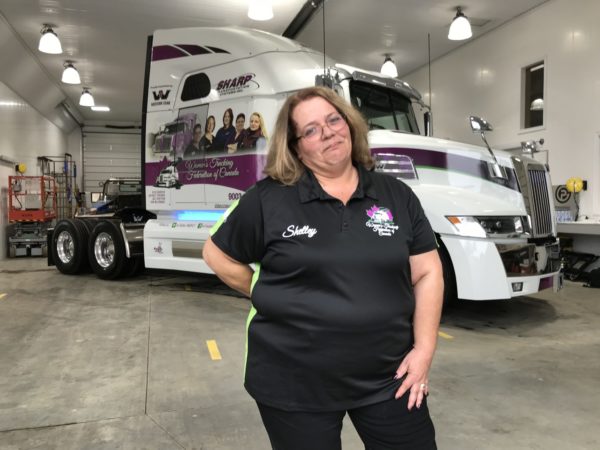Never have I doubted that women can do the trucking job as well as men, pretty much no matter what job we’re talking about. And there are tons of women in trucking already. Trouble is, at fleets they’re rate clerks and HR managers and dispatchers more often than not, rather than drivers or technicians. They can fill those latter roles too, and we need them there.
Things may be a little better with women employed at dealerships and supplier companies, but I expect they’re under-represented there too, especially in the shop. I don’t have figures that define the male/female employment ratio for the industry at large but I know that at the steering wheel it’s 3%. In the shop, a lot less than that, I expect.
One of the problems here is with women themselves. Many, maybe most of them who might consider a role as drivers or technicians, decide that it’s a man’s world and that they simply couldn’t do the job or couldn’t fit into a male-centric world. That was definitely not the case with a woman I met many years ago.

Not the ‘frilly’ type that an awful lot of men think is typical of women, though she did run a Peterbilt 359 painted shocking pink, the late Terry Wheatman was tough as nails and then some. Back in 1986 I went with her to pick up her new ride at the dealership in Toronto. She’d actually gone to the Pete factory in Texas to supervise the application of that very special paint. We drove around quite a bit that day as she simply enjoyed her new and very long-legged truck, with 425 Cat and twin-stick Spicer, easily capable of 100 mph – and often run at such speeds. It was an ‘outlaw’ truck and as a produce hauler mainly, she herself fit that description to a ‘t’. Her CB handle, Kittyhawk, was known far and wide. I liked her a lot.
But does a woman have to be like her to make a success of truck driving? Most definitely not, and I could name many successful women at the wheel who are almost Terry’s polar opposite.
Thirty years later I got to know another impressive young woman when she served on a panel at our Canadian Fleet Maintenance Summit in 2016. Vania Aghostino was an especially articulate panelist in a session focused on attracting young people of any gender to the shop. At the time she was an apprentice technician at the Brantford, Ontario branch of Carrier Centers, a thriving multi-store International and Isuzu dealership.
Agostinho wants to see more women in the tech role, and she wants the recruiting effort to start in high school or even elementary school. Girls should have exposure to the trade through job fairs and field trips early, she said.
I couldn’t agree more.
“I think women are scared [to pursue a technician apprenticeship] because it’s a male-dominated industry,” she told conference attendees. “If they knew that once you get out there, all the guys are pretty nice — nobody is going to go at you because you’re a female — they’d look into it.”
There’s no question that women seeking a role in trucking like Terry and Vania did will face challenges that men wouldn’t face, but they’re by no means insurmountable. And there’s help all over the place, especially because the shortage of willing and able drivers continues.
Shelley Uvanile-Hesch, for example, heads the Women’s Trucking Federation of Canada (wtfc.ca). Its self-stated mission is “… to bridge barriers, empower women and provide a positive platform for education, mentorship, networking and development within the trucking and transportation industry.”
A driver herself, she was inducted into the Private Motor Truck Council’s Hall of Fame for Professional Drivers in 2020 and was awarded the 2020 Woman of Inspiration Rural Leader honor as well. There’s nobody better to speak to about all this.
Then, for jobs in trucking at large, there’s Trucking HR Canada and its comprehensive Mentorship Programs for Women.
“Increasing women’s participation in Canada’s trucking industry is a business issue,” the organization says. “The trucking industry is rapidly changing. Its workforce is aging. Fewer young workers are entering the industry. At the same time, there are increasing demands for truck drivers as industries relying on trucking continue to grow. This means there is an urgent need for the trucking industry to recruit, develop and retain employees to meet the needs of its customer and consumers, and continue its critical role in supporting Canada’s economic growth.
“Women are a key source of talent but not a lot of women currently work in our sector. Research in many sectors and industries has shown that mentoring is a key retention tool. It is particularly useful in helping women to move into and be successful in occupations and sectors where they are under-represented. Having a mentoring for women program in place can also help in recruiting women to a company, communicating that it welcomes women employees, diversity and inclusion.”
I think it’s worth your while, as an employer or would-be employee, to check this out. Trucking is an exciting, ever-changing industry that gets a bad rap in some quarters. Don’t let that deter you.


